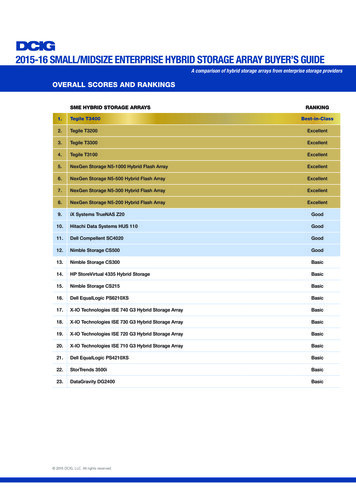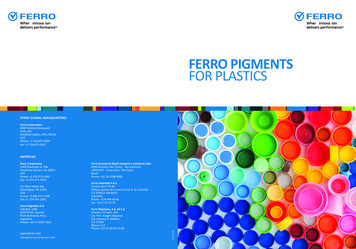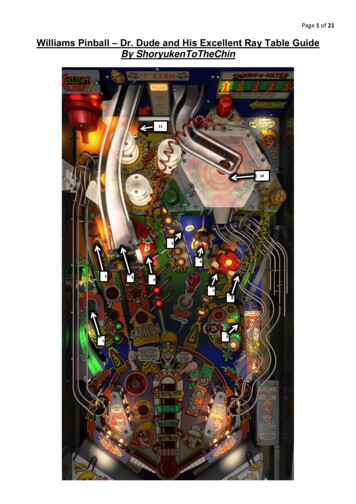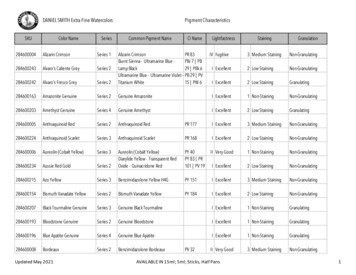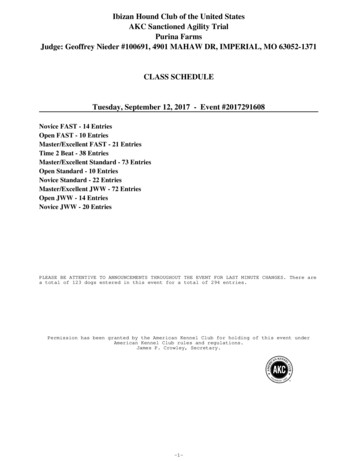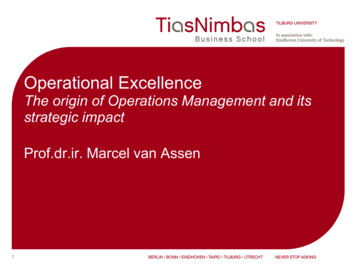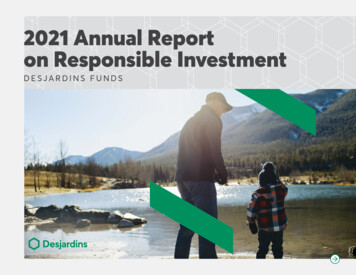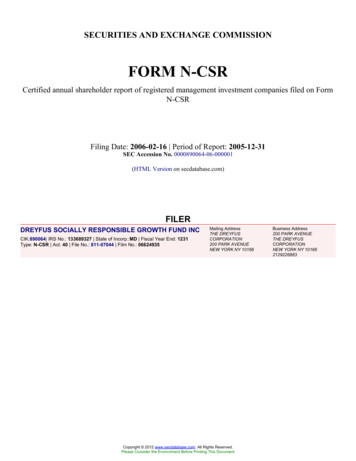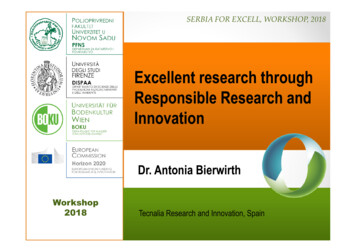
Transcription
SERBIA FOR EXCELL, WORKSHOP, 2018Excellent research throughResponsible Research andInnovationDr. Antonia BierwirthWorkshop2018Tecnalia Research and Innovation, Spain
Introduction to NewHoRRIzon2
Social LabsThe process consists of three interdependent, iterative activities: Diagnosis of the current RRI practices with H2020. This results in anunderstanding of barriers and enablers of embedding of RRI.Designing & implementing of social experiments to test overcoming thebarriersReflect on the outcomes of the experiments & to learn lessons for furtherexperimenting and future embedding of RRI into R&I policies &funding programmes.Social Labs offer spaces that facilitate this process. They enable diagnosis,observation and experimentation to take place at the same time and as partof the same intertwined process.3
The ambition of NewHoRRIzonNewHoRRIzon seeks to promote a strong integration of RRI into Horizon2020 (77 billion euros) and national research and innovation funding. Itsobjectives are to: Call together different stakeholders in R&I in 19 Social Labs for eachpart of Horizon 2020 to co-create social experiments thatFoster the uptake of RRIDevelop narratives and storylines on how to implement RRIProvide recommendations on how to better integrate RRI into the nextEuropean Framework Programme and beyondRaise awareness, mainstream best practices and share New-HoRRIzonresultsDevelop and disseminate a concept of Societal Readiness Levels (SRL)of technologyCreate a sustainable RRI Network and RRI Ambassador Programme.4
RRI in a nutshellResponsible Research and Innovation is: Involving society in science and innovation in the processes ofR&I to align its outcomes with the values of society. A wide umbrella connecting different aspects of therelationship between R&I and society A cross-cutting issue in Horizon 2020, the EU Program forResearch and Innovation 2014-2020.
RRI Definition“Responsible Research and Innovation is a transparent,interactive process by which societal actors and innovatorsbecome mutually responsive to each other with a view to the(ethical) acceptability, sustainability and societal desirabilityof the innovation process and its marketable products (inorder to allow a proper embedding of scientific andtechnological advances in our society).” (von Schomberg,2011:9)
Origin of RRIEU - GrandChallengesRRI Corporate social responsibility Ethical, Legal and Social Aspects of Research Research approaches Participatory Transdisciplinary Technology assessment Deliberative governance Public engagement
Why Responsible Research &Innovation?
Society is facing many challenges today Health,demographicchange, andwellbeingFood, agricultureand forestry, andwaterClimate action,environment, andresourcesSecure, cleanand efficientenergyEurope in a changingworld: inclusive,innovative andreflective societiesSmart, green andintegratedtransportSecure societies:freedom andsecurity of Europeand its citizensRRI tackles these challenges by aligning values, needs and expectationsof all actors involved in Research and Innovation
Challenge - driven researchA major part of the current EU Research Framework Programme“Horizon 2020” is dedicated to societal challenges.Challenge-driven programmes are usually interdisciplinary and oftencover the entire innovation chain from fundamental research todemonstration.Industry often plays a role in such programmes, but does not – andshould not - define their objectives.Positioned between investigator-driven basic research andindustry-driven research
Within the R&I system there have been examples ofcontroversies and failures in fulfilling societal expectations: GMOsfrackingfood safetyaffordable medicationamong others.in part because not all key actors were UNITYBUSINESS& INDUSTRYCIVIL SOCIETYORGANISATIONS
And there is also a large consensus that changesare needed throughout the R&I systemCertain key issues (or policy agendas) need to be taken into account:ETHICSResearch integrityand ethicalacceptability of theR&I outcomesGENDER EQUALITYHuman resources,decision bodies andresearch dimensionGOVERNANCEStructural changes toinclude all theseissues in the R&IsystemOPEN ACCESSTo results frompublicly fundedresearch, privacyissues and evenmore: open sciencePUBLICENGAGEMENTTowards a moreopen and inclusiveR&ISCIENCEEDUCATIONProvide competencesfor the responsiblecitizens society needs
RRI KeysFuente: https://blog.rri-tools.eu
Why RRI needs you as a member of the Research CommunityResearchers,innovators, researchmanagers, public affairsand communicationofficers, and all thosepeople who supportthe diverse aspects ofthe R&I systembelong to this group.WATCH VIDEO
RRI Keys Engagement: It implies that societal challenges should be framed on the basis ofwidely representative social, economic and ethical concerns and common principleson the strength of joint participation of all societal actors - researchers, industry,policymakers and civil society. Gender Equality: Addresses the underrepresentation of women, indicating thathuman resources management must be modernized and that the gender dimensionshould be integrated in the research and innovation content. Science Education: Faces the challenge to better equip future researchers andother societal actors with the necessary knowledge and tools to fully participate andtake responsibility in the research and innovation process. Open Access: States that RRI must be both transparent and accessible. Free onlineaccess should be given to the results of publicly funded research (publications anddata). Ethics: Requires that research and innovation respects fundamental rights and thehighest ethical standards in order to ensure increased societal relevance andacceptability of research and innovation outcomes. Governance: Addresses the responsibility of policymakers to prevent harmful orunethical developments in research and innovation. The latter is a fundamental basisfor the development of the rest of the dimensions.
PUBLIC ENGAGEMENTFacilitate structures forparticipation-Including public interest groups(CSOs, patient organizations, tradeunions, citizen panels) in thedefinition and supervision of R&I(advisory and evaluation boards,research ethics committees.)-Developing the creation of ScienceShops, Living Labs and other relatedstructures aiming at promotingmulti-stakeholder dialogue.Influence R&I Agendas-Promoting the use of facilitatingdeliberations methods to inducecitizens participation into R&Ipolicy-making.-Increasing citizens engagement inmonitoring transparency andtraceability of outcomes of R&Iprojects.-Advancing towards future-orienteddecision making.Co-develop and co-decideabout R&I-Fostering research projects withmore societally relevant outcomes,implementing participatoryresearch designs in an iterativefashion.-Promoting community-basedresearch.-Fostering participatory TechnologyAssessment.Source: andinnovation
Is there a wide variety ofstakeholders involved, such thatthere is a diversity of values and adiversity of types ing avariety mount18Is there diversity in thestakeholders engaged such thatall relevant voices are heard –silent as well as loud?Is there diversity within thestakeholder groups involved interms of gender, ethnicity,socio-economic status, age,disability etc.?Are sufficiently manyperspectives and participantsincluded, such that eventualoutcomes are robust?
Co-- creation methodologiesCoCommunity Based Participatory Research, OpenInnovation, Citizen Science, Living Labs, Science Shops,Science FestivalsFuente: Malagrida, R. 2017
ETHICSFacilitate structures forethical reflectionPromote and fosterresearch integrity-Strengthening ethical committeesand legislation about critical issues,some of them being theinvolvement of children, patients,vulnerable populations in research,the use of human embryonic stemcells and research on animals andnon-human primates.-Observing and promoting honesty,reliability, impartiality andindependence and objectivity inperforming research.- Promoting ethical issues inscientific policy advice-Avoiding fabrication, falsification,plagiarism or other researchmisconduct.-Developing legislation aboutprivacy and data protection issues.Source: 20-section/ethicMitigate and reduce ethicsdumping-Expanding ethical issues inresearch beyond EU countries.-Counteracting the application ofdouble ethical standards when lowand middle income countriesparticipate in research.-Rising awareness of insufficientethical standards when exploitingvulnerable parties in research.
GDPR training urse?submissionGuid 1a8f8f49-d99b-41e9-9af6-2a06aa1b5660
GDPR training urse?submissionGuid 1a8f8f49-d99b-41e9-9af6-2a06aa1b5660
GENDER EQUALITYGender Balance in decisionmakingGender balance in researchteams-European Commission aims at 40%of the under-represented sex inexpert groups and evaluationpanels.-Funding applications requestpromotion of gender balance at alllevels in their teams and inmanagement structures.-H2020, however, aims at 50% forthe under-represented sex in expertgroups and evaluation panels.-Commitment to promote equalopportunities between men andwomen in gran agreements.-Inclusion of gender experts inexpert groups and evaluationpanels.-Gender balance is a prioritizationcriterion.Source: http://ec.europa.eu/research/swafs/index.cfm?pg policy&lib genderGender dimension in thecontent of R&I-R&I need to adequately take intoaccount the needs, behaviours andattitudes of both women and men.-Consider gender-specificresearch to fill knowledge gaps.-Gender is an important factor inexcellent research.
In 2016, the unadjusted gender paygap stood at just over 16% in theEuropean Union (EU). In otherwords, women earned on average84 cents for every euro a manmakes per hour. Across MemberStates, the gender pay gap in 2016ranged from just over 5% inRomania and Italy, to more than25% in Estonia, followed by theCzech Republic and Germany(both almost 22%).
Gender Equality: Document df/pub gender equality/vademecum gender h2020.pdf
Gender Equality: EvaluationThe following approach will be applied successively for every group of ex aequoproposals requiring prioritisation, starting with the highest scored group, andcontinuing in descending order: (i) Proposals that address topics not otherwise covered by more highly-rankedproposals, will be considered to have the highest priority. (ii) These proposals will themselves be prioritised according to the scores theyhave been awarded for the criterion excellence. When these scores are equal,priority will be based on scores for the criterion impact. In the case of Innovationactions, and the SME instrument (phases 1 and 2), this prioritisation will be donefirst on the basis of the score for impact, and then on that for excellence. If necessary, any further prioritisation will be based on the following factors, inorder: size of budget allocated to SMEs; gender balance among thepersonnel named in the proposal who will be primarily responsible for carryingout the research and/or innovation activities.
OPEN ACCESS
OPEN ACCESS
GOVERNANCEIncorporate future-orientedgovernanceIncentivize RRI frominstitutions-Promoting foresight analysis in amulti-stakeholder basis includingpublic interest groups (CSOs, patientorganizations, trade unions, citizenpanels) to incorporate RRI principlesin all phases of R&I.-Embracing recognition systems ofRRI implementation, such as labels,rewards and indicators.-Facilitating frameworks for RRIimplementation throughout allstages of R&I process.-Setting up funding calls forresearch that take into account RRIissues.-Measuring the impact ofmainstreaming and standardisingRRI.Foster participatorygovernance-Promoting the use of facilitatingdeliberations methods to inducemultifactor participation into R&Ipolicy-making.-Including public interest groups(CSOs, patient organizations, tradeunions, citizen panels) in thesupervision of R&I (advisory andevaluation boards, research ethicscommittees.).
RRI Tools Projecthttps://www.rri-tools.eu/research-community
RRI products and processesRRI can be understood as:Responsible impacts and outcomes of the R&I processProcess requirements of responsible R&I processes
Citizens empowered withcompetences to engagein RRI process effectivelyRRI Outcomes & ImpactsLearning outcomesR&I outcomesSocietal impactsActors think and act accordingto principles of RRI Engaged Publics EthicallyacceptableContribute to solvingsocietal challenges Environmentallysustainablee.g. 7 GrandChallenges (EU) Responsible actors ResponsibleinstitutionsRRI process institutionalized inacademia and other relevantorganizations33 Socially desirableinnovations
Variety of researchersfrom different disciplinesand broad range ofstakeholders identifiedRRI Process RequirementsAll relevant stakeholdersinvited to participateImagining plausible anddesirable futures andtechnology pathsOpen to needsof othersMeaningful, addressingpurpose and context34Ability to changeprocess and paths
RRI can empower science communities to bond with society in solving ourworld's challenges, providing:A whole new framework: new thinking, new principles, new processesA more society-centered Research and InnovationNew funds through the EC’s R&I programmes (Horizon 2020 )
Benefits of RRI
HEIRRI video: A future scenario on Ageinghttps://www.youtube.com/watch?v geM3uCh4qYM
Antonia Bierwirth, Ph.D.Project ManagerTecnalia Research & InnovationM/C 34 664041808Skype: antonia.bierwirth
GOVERNANCE Structural changes to include all these issues in the R&I system OPEN ACCESS To results from publicly funded research, privacy issues and even more: open science PUBLIC ENGAGEMENT Towards a more open and inclusive R&I SCIENCE EDUCATION Provide competences for the responsible citizens society needs. RRI RRI KeysKeys Fuente: https://blog.rri-tools.eu. Why RRI needs you as a member of .
